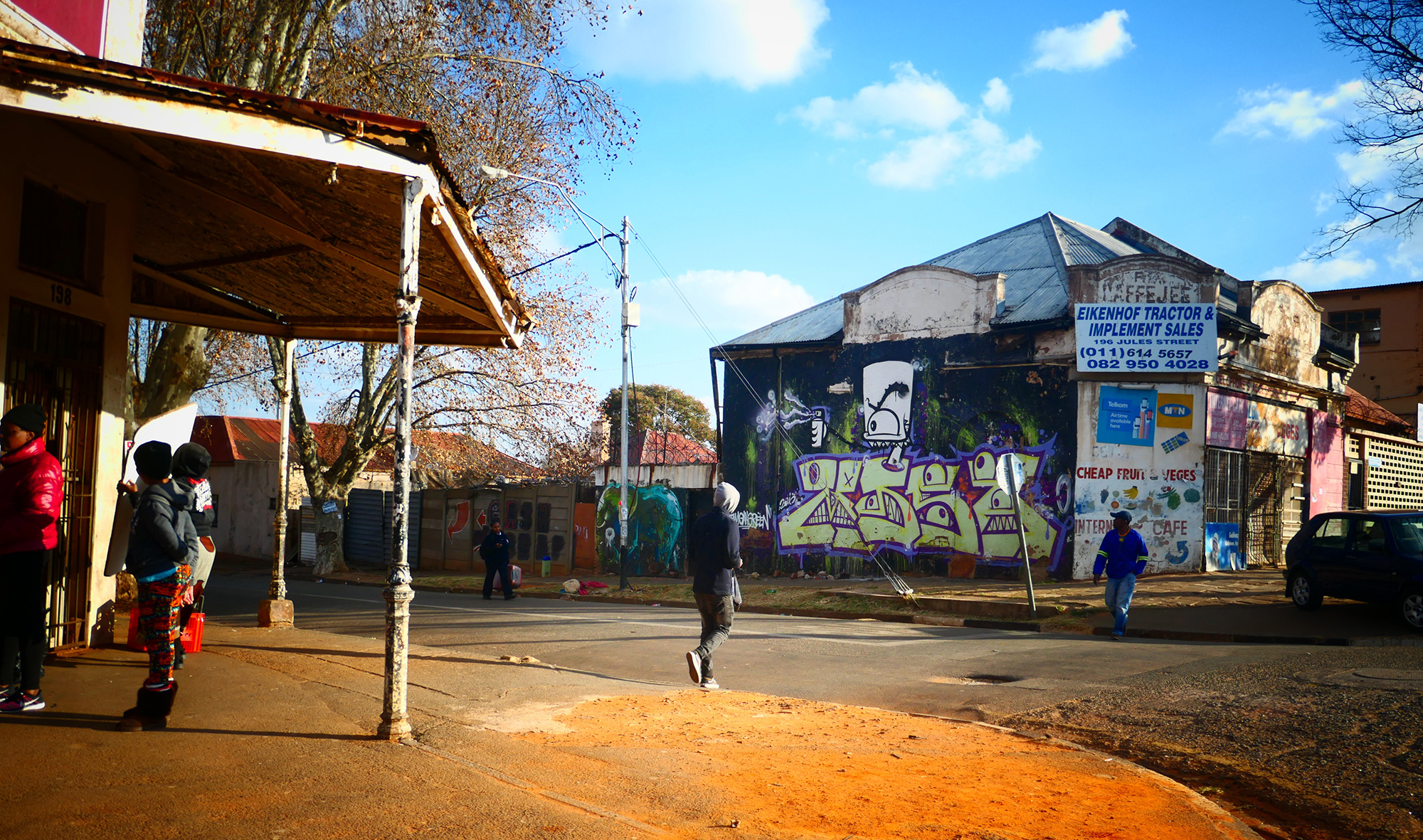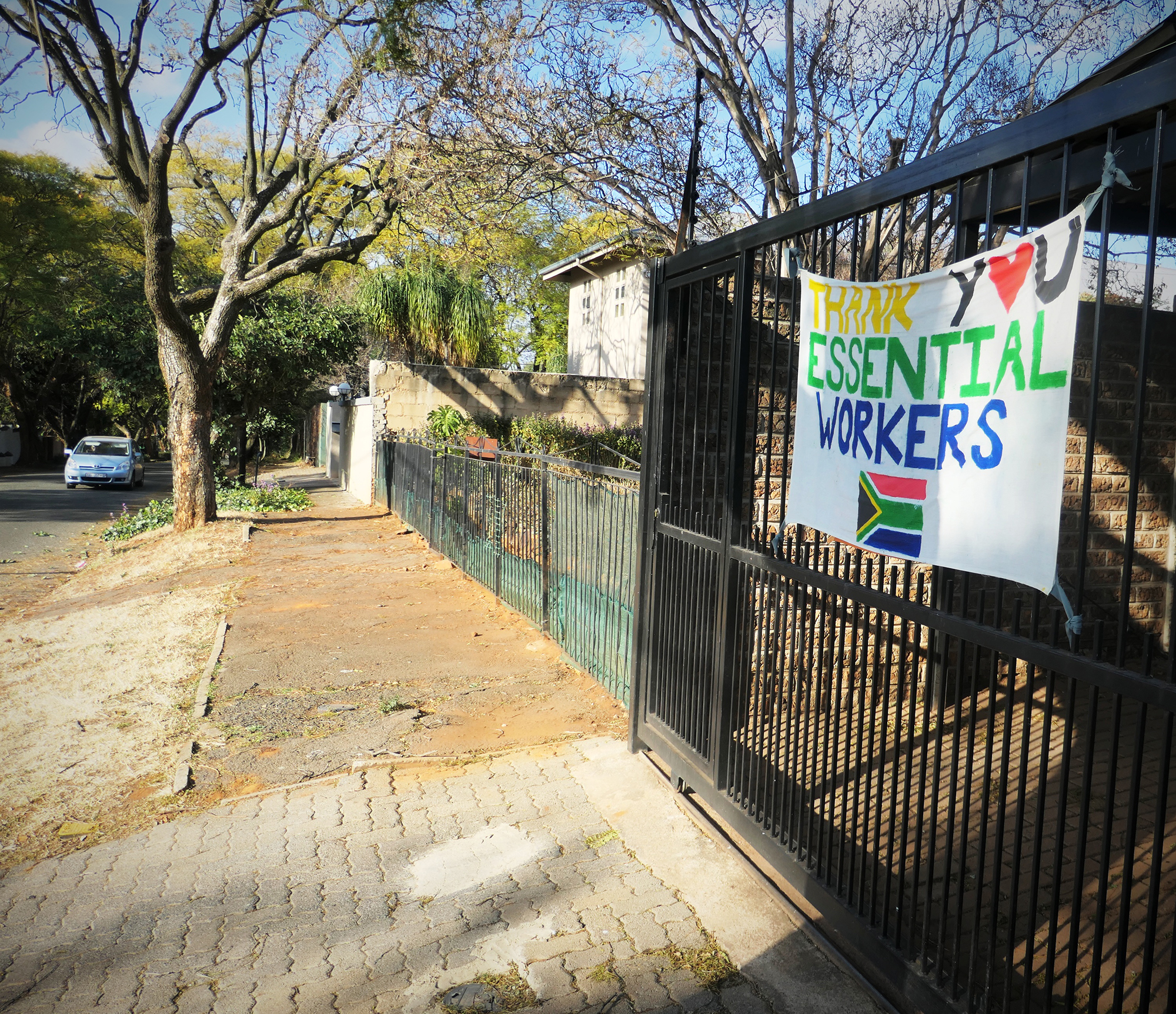The number of dead is growing faster and faster now as each morning they claim another section of the green palisade fence.
It is on this fence that rings the St James Presbyterian Church in Bedford Gardens that Silva Cossa ties a new crop of ribbons first thing every morning.

Jules street in Malvern lies in Johannesburg’s Region F, one the areas hard hit by the virus. (Photo: Shaun Smillie)
Each ribbon represents a South African Covid-19 death and on Wednesday 8 July it took a while for the church caretaker to tie the 192 satin ribbons to the fence.
To date, it was South Africa’s highest death toll for a 24-hour period, and in that number were 75 Gautengers, making it a record day for the province too.
Cossa began this morning ritual back when South Africa had recorded 28 deaths. It started after the church’s Reverend Gavin Lock felt he and his congregation needed to do something.

Reverend Gavin Lock, of the St James Presbyterian church in Bedford Gardens, believes that he and his congregation have to do something to honour those who have died from the Covid-19 pandemic. (Photo: Shaun Smillie)
“We needed some visual indication, that those dying are real people who have families who have lost loved ones,” explains Lock.
There was a time not so long ago when some optimistically suggested that South Africa might be spared the death rates of other countries. That perhaps the BCG vaccine or even the warmer climate would prove to be a match for this killer virus.
Now, as South Africa regularly hits triple-digit daily death numbers there is a growing realisation that the country will not be spared. Health Minister Dr Zweli Mkhize warned on Wednesday that the storm had arrived and that by the evening Gauteng would surpass the Western Cape and become the county’s epicentre.

Alexandra has seen a spike in Covid cases, but still residents crowd the streets and malls of the township. (Photo supplied)
Lock’s congregation is drawn from across Joburg. They come from Bedfordview, Malvern, Malvern East, Kensington and as far as Sandton. Some of these regions have become virus hotspots in the city.
Just 150m down the road from the St James Church is Sovereign Street, that marks the boundary of the start of Joburg’s Region F. This is a big area that stretches from Kensington in the east to Lenasia in the west.

Across some suburbs in Johannesburg, essential workers like health care personnel are recognised for the dangerous work they do. (Photo: Shaun Smillie)
By Wednesday, Region F had the second-highest number of Covid-19 infections in Johannesburg, with 7,045. Across these suburbs, the virus is finally showing itself and making its presence felt. Just off Sovereign Street is a Covid-19 testing station at the Bedford City Gardens hospital. On most days now, there are queues of people waiting to be tested.
A kilometre up the road from St James, the Cleveland police station on Wednesday was closed after a policeman tested positive for the disease.
On nearby Jules Street – a part of the city with a gritty reputation and jokingly referred to as “the straightest street in Joburg, where the crookedest people live” – businesses and residents are feeling the virus increasingly touch their lives.

As Johannesburg experiences a surge in Covid-19 infections, many of its residents are still refusing to wear masks. (Photo: Shaun Smillie)
“Every morning I wake up and I pray to God that he sends this virus to the darkest pit of hell,” says a shopkeeper who runs a glass shop. He recently experienced his first funeral under lockdown conditions, where police strictly enforced social distancing among the mourners.
“It is getting close now,” says Blessing Ncube, the owner of a hairdressing salon, “and people are getting scared.” Still, knots of people could be seen crowding outside betting shops and liquor stores. No social distancing there.
Further along Jules Street, Pride Mayisela told Daily Maverick a classmate of his had died of Covid-19 in the UK. He was from KwaZulu-Natal. It seemed that it would be simply a matter of time before the virus moved into the interior and turned South Africa’s biggest city into its epicentre.
The city has the largest population, there is high-density living, migration and Joburgers don’t like to be told what to do.
Across the world, there have been instances where the virus has bypassed big cities and concentrated on smaller centres. In South Korea, Seoul was spared. Rome didn’t have the numbers of infection as in northern Italy.
But in Joburg the surge has begun, and those tracking the disease are facing challenges. For one, it is difficult to pinpoint infection hotspots.
“It’s very very difficult to get an overview of… [infections] because the data relies on geographically locating addresses of positive cases on a map,” says an analyst who is working to support the Gauteng Provincial Government in tracking Covid-19 data and who asked to remain anonymous.
“Basically, the labs get information from points where the specimen is collected, such as private labs or clinics. And it really does depend on whether the address is well taken down or not at those points. So, you can imagine a scared, overwhelmed, exhausted nurse basically trying to scribble down an address as quickly as possible in order to get this risky person in front of them away from them as quickly as possible. Understandably, the addresses coming from those contexts are not well recorded.”
There are other address challenges too. Informal settlements often have their own numbering conventions that don’t correspond to municipal maps or Google Earth. Efforts have been made to improve the accuracy of this data. The provincial government, says the analyst, is working on collecting more accurate data.
There are teams who, if they have the cellphone numbers of infected patients, will phone them to establish where they live. Scientists are looking at other ways to identify geo-locations.
Still, the data does show where the disease is spreading rapidly. Some point to hyper-local events, like old age homes with high rates of infections in Joburg’s more affluent suburbs.
On Thursday 9 July, the Gauteng Department of Health confirmed that six members of the Covid-19 war room had tested positive for the virus. On a suburban level, some parts of Soweto, Mayfair and Alexandra have shown recent spikes.
The irony is that Alexandra experienced some of the harshest policing when the army and police stamped their authority on the township during the early days of the lockdown. Some residents say it didn’t work. The citizens crowd the narrow streets and many still refuse to wear masks.
The Western Cape saw shopping centres spreading the disease, while in the Eastern Cape it was funerals and hospitals that boosted infection rates. In Joburg, it is minibus taxis that are the big unknown.
“The small malls we have are packed every day, the streets are packed,” says Alexandra tour guide Rachel Phasha.
“I was asking some children who were playing near where I live, why they are not wearing masks. They told me: ‘It won’t infect us, as we are children. The disease is for the elders.’ ”
Others have noticed that Alex residents have in fact begun to slowly realise that the disease is affecting their township.
“Some people were saying that this is for white people, but most are seeing that it is affecting their families, and they are taking it differently now,” says Ngcobo Ncube, the co-owner of Kusekhaya Cafe on 3rd Avenue, in Alexandra.
But these infection flare-ups move quickly across the city. In mid-June the suburb of Mayfair was a hotspot, but since then the numbers have eased off. Super-spreader events are believed to be driving Joburg’s climbing infection rate.
“Super-spreaders tend to be shopping centres, funerals – we should have never allowed 50 people gathering – you also have call centres and pharmacies. Anywhere where people are sitting for a long period of time,” says Professor Alex van den Heever, the chair at Social Security Systems Administration and Management Studies at the University of the Witwatersrand’s School of Governance.
The Western Cape saw shopping centres spreading the disease, while in the Eastern Cape it was funerals and hospitals that boosted infection rates. In Joburg, it is minibus taxis that are the big unknown.
“It is very difficult to trace if an infection came from a ride in a taxi. You can’t really work out if it was from there or somewhere else. The issue is, even if you are in there for 20 minutes, at 70% capacity, you are still at high risk,” explains Van den Heever.
The international concern now is that Covid-19 might be airborne. That the deep-cleaning regimes that by law sites have to undergo when there is a Covid-19 outbreak are not enough to rid the area of the disease.
Van den Heever, like so many others, would like to see the provincial government release more detailed data that drills down to neighbourhood level. This would allow residents to know where the virus outbreaks are happening. It will make them aware of just how close the virus is.
At St James Church in Bedford Gardens, drivers slow their cars to stare at the ribbons that flutter in the wind.
Lock is concerned that as the number of Covid-19 dead continues to rise, they will soon run out of space. The added 192 ribbons claimed just over 3m of fence that day. As the numbers grow, Silva’s workload is going to increase.
“We might need to bring volunteers in to help Silva tie ribbons,” Lock says. DM






 Become an Insider
Become an Insider